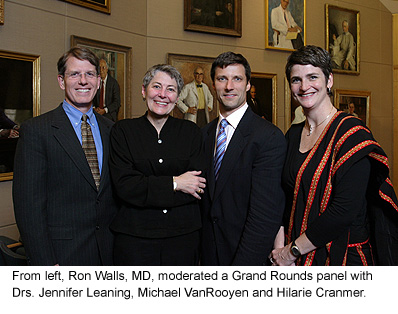Medical Humanitarian Experts Take Center Stage

The April 12 Medical Grand Rounds focused the spotlight on a special strength of BWH specialists' ability to apply their expertise beyond the walls of the hospital.
The first Grand Rounds sponsored by the newly formed Physician Council showcased the humanitarian efforts of Emergency Medicine's Jennifer Leaning, MD, MPH; Michael VanRooyen, MD, MPH and Hilarie Cranmer, MD, MPH in lands stricken by natural disasters or human conflict. The three physicians are members of the Department of Emergency Medicine's new Division of International Health and Humanitarian Programs.
Leaning provided an overview of the politics and epidemiology of humanitarian response with a focus on the complex interplay between the afflicted population and multiple relief organizations. She noted that the Asian Tsunami situation uniquely combined the most difficult features of both disaster and war. Two of the four affected countries were involved in some sort of a conflict, she observed, and the Tsunami itself inflicted an astonishing death rate, resulting in an unparalleled ratio of deaths to injuries. She went on to explain how the collaboration between Harvard School of Public Health and BWH shines in these circumstances, combining expertise in population epidemiology and medical care delivery.
VanRooyen, the division chief, who recently returned from Darfur, Sudan, spoke to the specific mechanisms of humanitarian crises induced by human conflict and the inherent risks to vulnerable populations, while he debunked myths and misconceptions related to such catastrophes. “A common myth is that all foreign volunteers are welcome-that those with any kind of medical background are needed. This is not so,” said VanRooyen. Instead, he explained that it is risky to send clinicians untrained in disasters into the disaster zone.
The Rounds' last, highly-anticipated panelist, Dr. Hilarie Cranmer, shared accounts of her field work in the Aceh Province of Indonesia in response to the devastating Tsunamis in January. Cranmer walked the audience through the various challenges she and the other members of the International Rescue Committee (IRC) faced. Although organized into teams of six that each contained specialists in logistics medicine, sanitation and social issues, many obstacles awaited the teams due to the unique circumstances of this particular disaster.
Cranmer told her story through her “patients.” She recounted the tale of Inda, a young girl who was the first detected with measles in the camp to which Cranmer was assigned. Absent optimal supplies, communication mechanisms and other key resources, Cranmer explained the difficulties of isolating Inda in a refugee situation, while attempting to immunize the 1,000 other youngsters in the camp who'd be at risk.
Ron Walls, MD, chairman of the Department of Emergency Medicine, who moderated the panel, reflected the sentiments of the audience when he praised the trio, pinpointing their selfless efforts on behalf of BWH and mankind.